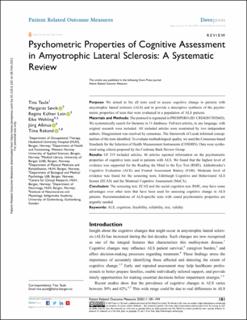Psychometric Properties of Cognitive Assessment in Amyotrophic Lateral Sclerosis: A Systematic Review
Taule, Tina; Søvik, Margaret Ljosnes; Lein, Regina Küfner; Wehling, Eike; Assmus, Jörg; Rekand, Tiina
Journal article, Peer reviewed
Published version

Åpne
Permanent lenke
https://hdl.handle.net/11250/2761308Utgivelsesdato
2020Metadata
Vis full innførselSamlinger
- Registrations from Cristin [9791]
- University of Bergen Library [130]
Originalversjon
Patient Related Outcome Measures. 2020, 11, 181—194. https://doi.org/10.2147/PROM.S256828Sammendrag
Purpose: We aimed to list all tests used to assess cognitive change in patients with amyotrophic lateral sclerosis (ALS) and to provide a descriptive synthesis of the psychometric properties of tests that were evaluated in a population of ALS patients.
Materials and Methods: The protocol is registered in PROSPERO (ID: CRD42017055603). We systematically search for literature in 11 databases. Full-text articles, in any language, with original research were included. All included articles were scrutinised by two independent authors. Disagreement was resolved by consensus. The framework of Lezak informed conceptualises of the tests identified. To evaluate methodological quality, we used the Consensus-based Standards for the Selection of Health Measurement Instruments (COSMIN). Data were synthesised using criteria proposed by the Cochrane Back Review Group.
Results: Of 319 included articles, 46 articles reported information on the psychometric properties of cognitive tests used in patients with ALS. We found that the highest level of evidence was supported for the Reading the Mind in the Eye Test (RME), Addenbrooke’s Cognitive Evaluation (ACE) and Frontal Assessment Battery (FAB). Moderate level of evidence was found for the screening tests; Edinburgh Cognitive and Behavioural ALS Screen (ECAS) and the Montreal Cognitive Assessment (MoCA).
Conclusion: The screening test, ECAS and the social cognition test, RME, may have some advantages over other tests that have been used for assessing cognitive change in ALS patients. Recommendations of ALS-specific tests with sound psychometric properties are urgently needed.
